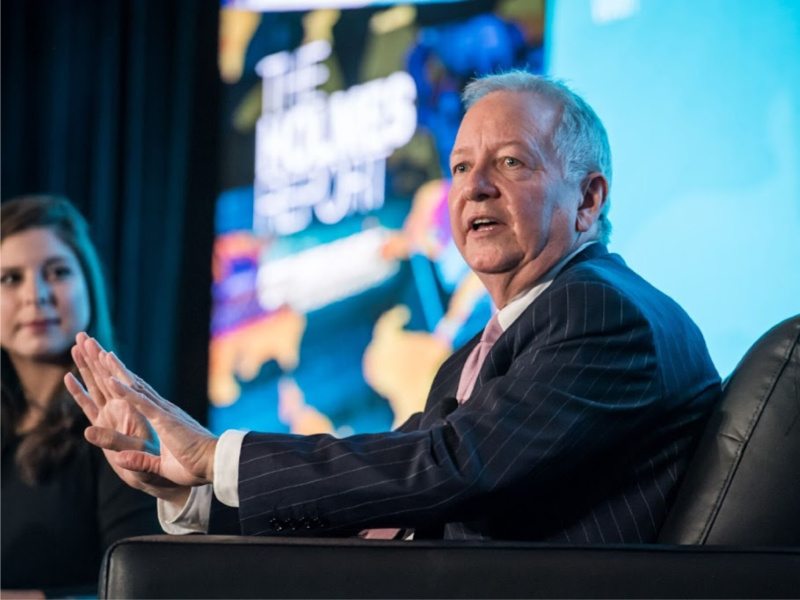Paul Holmes 23 Oct 2018 // 4:15PM GMT

WASHINGTON, DC—"The most progressive brand builders have a very simple philosophy: everything is brand,” Ogilvy’s worldwide chief executive John Seifert told the audience at PRovoke18 this morning, adding that “PR people are more likely to be whole brand thinkers than anyone else in the marketing mix.”
Great brand-builders, Seifert said, think systematically about the entire brand experience with every audience and stakeholder groups. And PR people, he said, are used to thinking that way because “they have always thought about brands from the inside, about employees and the leadership of the company, and about aligning what the company says with what it does.”
Seifert appeared in conversation with Axios media reporter Sara Fischer in a session focused on “Driving Business Impact in an Earned First World,” and participated in a wide-ranging discussion that encompassed changing agency models, a shifting competitive landscape, and the implications for PR professionals.
Earlier in the discussion, Seifert talked about the ways in which a fast-changing and increasingly challenging business climate was impacting the marketing services sector.
“Agencies are not immune to the challenges of business generally,” he said. “The common elephant in the room is sustainable growth. Our industry now faces more questioning than ever. Are we part of the solution or part of the problem? Are we out of touch with the consumer? So we have to continually prove that we are part of the solution, that we can contribute to sustainable growth.”
That means that some of the traditional approaches to marketing and brand-building are no longer sufficient: “The idea that you can just create an ad, making it entertaining, and people would buy the product, that’s over.”
He cited a meeting with Paul Polman, CEO of Unilever, and some of his marketing agencies. Polman, he said, expressed concerns: “We have to be concerned, because we think the consumer is changing faster than we are, and you’re in trouble because we think we are changing faster than you.”
He also cited last year’s incident involving United Airlines, and a passenger who was dragged from a flight to make way for United employees.
“On one level, you could argue that that’s a user experience problem. But at the end of the day it’s a brand problem, and when it’s recorded and shared with the world, it’s a PR crisis. You have to think about everything being about brand, from a promise to an experience to how people experience it happening.”
He also discussed a number of challenges facing marketers and their agencies.
On ensuring that work has a business impact: “We have to be sure that the work we do contributes to a more loyal customer, we have to be seen as valuable in that chain. Connecting everything we do to a market outcome is what will determine how we are viewed. It can be sales, market share, preference, customer satisfaction, how much a consumer is willing to pay for incremental services. It depends on the business model of the client, what creates value for them that translates into growth and shareholder value.”
On clients bringing services inhouse: “Many clients feel they have lost control. They feel they have ceded too much responsibility for branding, and how they go to market, to external partners. But the downside is you can become insular and myopic in understanding how cultures are changing and consumers are evolving. So clients need control but they have never needed more external perspective, more consumer insight, that they can’t do entirely on their own.”
On management consulting firms competing with more traditional agencies: “The consultants are definitely disruptive. In the short term, management consulting firms were typically advisory. They could provide analysis at scale. They would give their advice and then they would leave. Now they were being brought on board to help build capability, through a technology platform for example, and now they see an opportunity to stick around and execute ideas and that’s in our territory. How effective they will be, the jury is still out.”
On recruiting and retaining talent: “We have to create an environment where the best people feel they can come every day and do their best work and have fun and if we don’t do that every day, if we can’t make them come to work excited every day, then they will find somewhere else.”
And finally, on the agency landscape in the future, and the holding company model in particular: “The holding company model served a purpose for many years of consolidating and allowing new capabilities to be put, theoretically, under one roof. Now you are going to see clients increasingly curate the capabilities they need from a host of different suppliers. Holding companies will have a role, boutique and specialist agencies will have a role, talented individuals will have a role, because it’s very easy to find those individuals.
“But the idea that there will be one access point for all this talent, and one model, is complete nonsense.”


































.jpg)

















